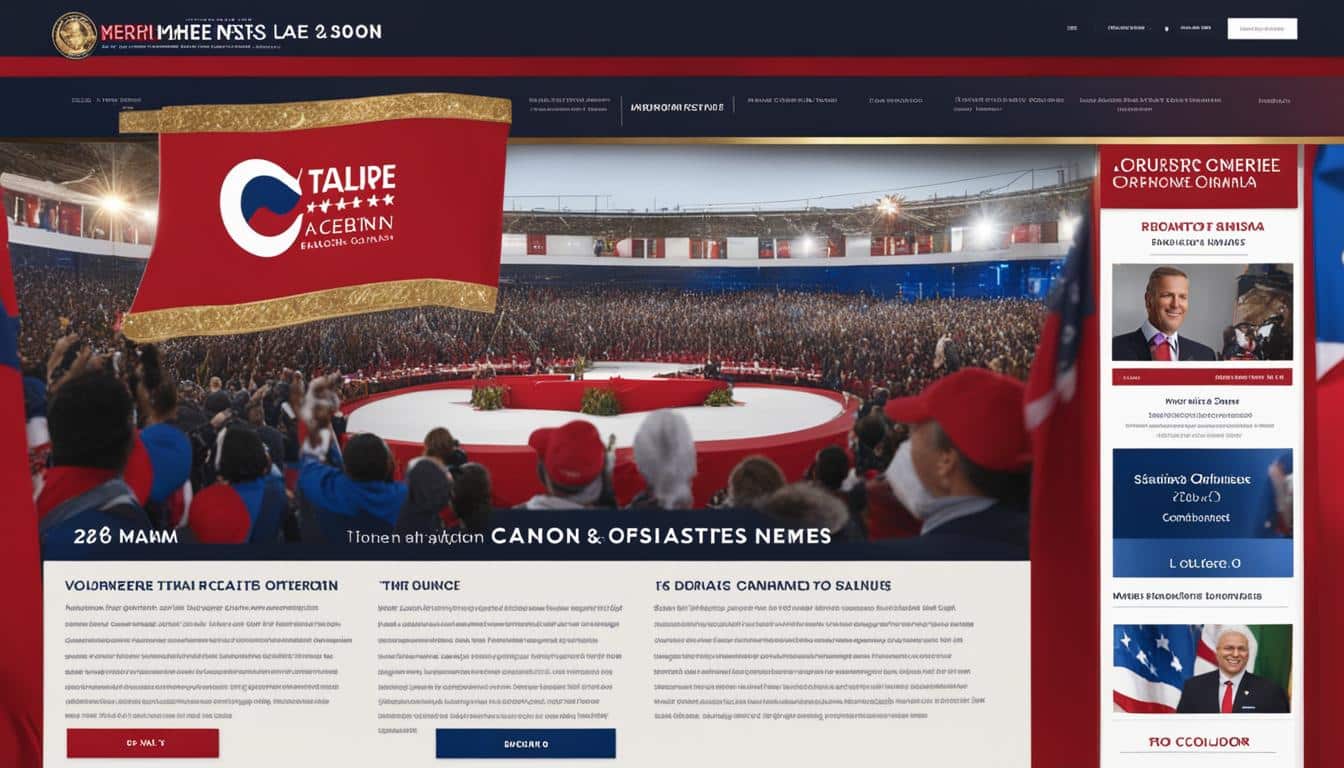
Social media has revolutionized political campaigns, transforming the way politicians connect with voters and disseminate information. In today's digital age, political campaigns must utilize various platforms to engage the public and strategically navigate the online landscape. One crucial aspect of a successful political campaign is the creation and optimization of a compelling website that showcases the candidate's platform, values, and vision.
A well-designed political campaign website serves as a central hub for supporters, donors, and undecided voters to learn more about the candidate, get involved in the campaign, and stay informed about upcoming events and initiatives. It should not only provide essential information but also create a memorable user experience that resonates with visitors.
When developing a political campaign website, it's crucial to consider its functionality, accessibility, and visual appeal. Navigation should be intuitive, ensuring visitors can find information easily and quickly. The website should also be optimized for mobile devices, as a significant portion of internet users access information through smartphones and tablets.
Furthermore, incorporating impactful visuals, such as high-quality images and videos, can enhance the overall look and feel of the website, captivating visitors and effectively communicating the candidate's message. Emphasizing the candidate's achievements, endorsements, and testimonials can also instill confidence in potential supporters and undecided voters.
Ultimately, a well-executed political campaign website can make a significant difference in attracting supporters, raising funds, and mobilizing voters. By leveraging the power of digital platforms, candidates can effectively connect with their target audience and create a positive online presence that resonates with voters.
Key Takeaways:
- A compelling political campaign website plays a crucial role in engaging supporters and attracting undecided voters.
- Optimize the website for functionality, accessibility, and visual appeal.
- Ensure intuitive navigation and mobile optimization for a seamless user experience.
- Incorporate impactful visuals to enhance the website's overall look and feel.
- Highlight the candidate's achievements, endorsements, and testimonials to instill confidence in potential supporters.
How Social Media Has Transformed Political Campaigns
Social media has revolutionized the way political campaigns are conducted, fundamentally transforming the landscape of political communication. With the rise of social platforms such as Twitter, Facebook, and Reddit, politicians now have unprecedented access to wider audiences, enabling them to break their own news and connect with constituents in real-time.
Trust in mainstream news sources has declined in recent years, with many adults under 30 turning to social media for news consumption. This shift in media consumption habits has made social media a crucial platform for political campaigns to reach and engage with voters. In addition to providing a direct line of communication between politicians and the public, social media also offers real-time fact-checking, allowing for the rapid dissemination of accurate information and the debunking of false narratives.
"Social media has become a game-changer for political campaigns, enabling candidates to bypass traditional media and have direct conversations with their constituents. It has given us the ability to share our message, mobilize supporters, and raise funds on a scale never seen before."
Furthermore, social media advertising has emerged as a powerful fundraising tool for political campaigns. Since 2018, billions of dollars have been spent on social media ads, allowing candidates to effectively target and reach specific voter demographics. This targeted approach to fundraising has revolutionized the way campaigns generate financial support and has leveled the playing field, enabling candidates with limited resources to compete against more well-funded opponents.
| Social Media Impact on Political Campaigns | Key Takeaways |
|---|---|
| Wider Reach | Social media platforms have enabled politicians to reach wider audiences and break their own news. |
| Real-time Communication | Direct communication between politicians and voters in real-time, fostering engagement and transparency. |
| Fact-checking and Debunking | Social media provides a platform for real-time fact-checking and debunking of false narratives. |
| Fundraising Opportunities | Social media advertising has become a major fundraising tool for political campaigns. |
The impact of social media on political campaigns cannot be overstated. It has revolutionized the way politicians communicate, engage with voters, and fundraise. As social media continues to evolve and play an increasingly significant role in our lives, political campaigns must adapt their strategies to leverage the power of these platforms.
10 Tips for Running a Political Campaign on Social Media
Social media has revolutionized the way political campaigns are run, offering unique opportunities for engagement, fundraising, and outreach. To help political candidates navigate the complexities of the digital landscape, here are 10 essential tips for running a successful campaign on social media:
- Engage the public: Generate interest and foster meaningful dialogue with constituents by regularly posting live content, such as Q&A sessions or behind-the-scenes updates.
- Fact-check your content: Maintain credibility and combat misinformation by thoroughly fact-checking all content before publishing. Accuracy is key to building trust with your audience.
- Target younger audiences: Don't limit your social media presence to traditional platforms like Twitter and Facebook. Consider utilizing platforms like Instagram and TikTok to reach and engage with younger voters who are highly active on these platforms.
- Highlight fundraising efforts: Make your fundraising efforts a central focus of your social media strategy. Run targeted ads, share personal stories, and include secure links to encourage supporters to donate to your campaign.
- Deal with trolls effectively: Develop strategies to handle negative comments and trolls. Respond tactfully, stay on message, and maintain a professional and civil online presence to avoid being dragged into unproductive debates.
- Engage with relevant accounts: Recognize that not everyone is passionate about politics. Focus on engaging with accounts and communities that are relevant to your campaign's goals and target audience.
- Ask and answer questions: Boost engagement by actively asking your followers questions and responding to their inquiries. This shows your willingness to listen and connect with your constituents.
- Utilize visual content: Enhance engagement by incorporating visual content such as videos, infographics, and compelling images into your social media strategy. Visuals are highly shareable and can effectively convey your campaign's message.
- Balance political discussions: While it's important to promote your political agenda, include positive and non-partisan posts in your content strategy to create a more balanced and relatable online presence.
- Execute a get-out-the-vote plan: Motivate your supporters by developing and executing a comprehensive get-out-the-vote plan. Encourage voter registration, provide information on polling locations, and emphasize the importance of civic participation.
Implementing these tips will help political campaigns effectively leverage social media platforms to connect with voters, communicate their message, and mobilize support. By utilizing the power of social media, candidates can create a strong online presence and increase their chances of success in the digital age of politics.

Conclusion
Social media has revolutionized political campaign strategies, providing effective ways to engage with the public and generate support. Political campaign websites have become essential in this digital age, allowing candidates to convey their message, solicit donations, and connect with voters. By leveraging social media platforms and implementing the right strategies, political campaigns can make a significant impact.
Engaging the public through live content and encouraging meaningful dialogue is crucial. It helps establish a direct line of communication between candidates and constituents, fostering trust and transparency. Furthermore, fact-checking content before publishing is essential for maintaining credibility and combating misinformation.
Targeting a younger audience on platforms like Instagram and TikTok is another key strategy. Younger voters are more likely to consume news through social media, making it a crucial channel for reaching this demographic. Running ads and using secure links for fundraising efforts is also an effective way to generate financial support for campaigns.
Dealing with trolls effectively is vital to maintaining a civil online presence. It's important to have well-defined strategies in place to address negative comments and maintain the focus on meaningful engagement. Additionally, incorporating visual content such as videos and infographics enhances engagement and makes the campaign more captivating.
In conclusion, political campaign websites and social media platforms have transformed the landscape of political campaigns. By implementing effective strategies and utilizing the power of social media, candidates can engage with voters, raise funds, and ultimately make a greater impact in the digital age.
FAQ
What role does social media play in political campaigns?
Social media has become an integral part of political campaigns, allowing for real-time communication, fundraising opportunities, and direct engagement with voters.
When did the use of social media in political campaigns gain significance?
The use of social media in political campaigns gained significance in the 2008 United States presidential elections.
What social media platforms are popular for consuming political news?
Platforms like Twitter, Facebook, and Reddit are popular sources of news for users.
Why do adults under 30 trust news from social media platforms?
Trust in mainstream news sources is low among young adults, leading them to trust news from social media platforms.
What benefits does social media provide for political campaigns?
Social media provides real-time fact-checking, direct communication between politicians and voters, and the ability to reach wider audiences in real-time.
How does social media advertising impact political campaigns?
Social media advertising has become a major fundraising tool for political campaigns, with billions of dollars spent on ads since 2018.
Can social media be used as a tool for political fundraising?
Yes, social media advertising has become a major source of fundraising for political campaigns.
How can political campaigns engage the public on social media?
Political campaigns can engage the public via live content, encourage meaningful dialogue with constituents, and ask and answer questions to boost engagement.
How can political campaigns combat misinformation on social media?
It is important to fact-check content before publishing to maintain credibility and combat misinformation.
Which social media platforms should political campaigns target?
Political campaigns should not limit their social media presence to Twitter and Facebook; considering targeting younger audiences on platforms like Instagram and TikTok.
How can political campaigns effectively deal with trolls on social media?
Political campaigns should develop strategies for dealing with trolls and maintaining a civil online presence.
Should political campaigns focus solely on politics when engaging on social media?
Not everyone is interested in politics, so it is important to focus on engaging with relevant accounts and include positive, non-partisan posts in the content strategy.
How can political campaigns enhance engagement on social media?
Political campaigns can use visual content such as videos and infographics to enhance engagement.
What should political campaigns do to motivate supporters to vote?
Political campaigns should develop and execute a get-out-the-vote plan to motivate supporters to vote.
How has social media transformed political campaigns?
Social media has transformed the landscape of political campaigns, allowing for real-time communication, fundraising opportunities, and direct engagement with voters.
What strategies can help political campaigns succeed in the digital age?
Providing valuable and engaging content, along with strategic planning, can help political campaigns succeed in the digital age.











